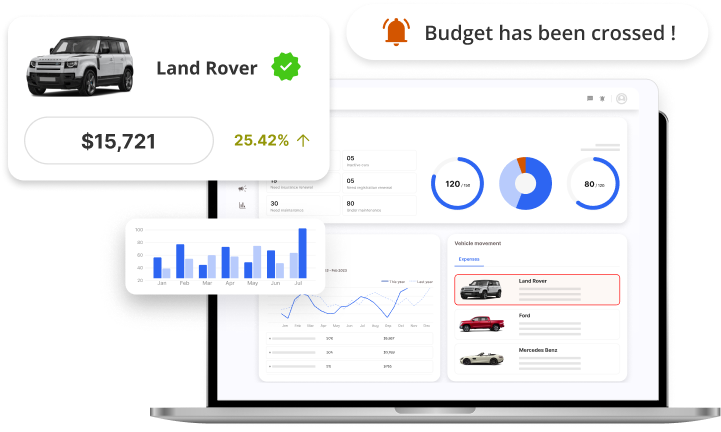The expense of fleet vehicles and services can determine the success of an organization. As the costs of fuel continues to rise, sailors deal with volatile maintenance costs, and regulations continue to grow in complexity, the management of costs across fleet to be profitable, is not simply from experience alone, but from fleet management cost analysis. A fleet can be an expensive proposition. If an organization does not have a clear plan for the maintenance of the vehicles, management of the fuel, management of the drivers, or regulatory compliance plans, costs can escalate very quickly.
That is why fleet management cost analysis is so important. Knowing where money is spent-and where spending could be improve-is often the difference between having a lean operation and loosing profits. By having a sound, repeatable cost analysis an organization will be able to make good decisions to contain operating expense and improve fleet efficiency.
AI-based fleet management platforms like Fleetblox offer real time data and predictive maintenance alerts and actionable insights which reduce maintaince and compliance risks to the operation of your fleets, and subsequently reduce fuel use. These technologies allow an organization to leverage tracking costs to active managers for improved management of costs and real-time management of savings.
What Is Fleet Management Cost Analysis?
The fleet management cost analysis is the procedure of assessing the total cost of operating a fleet; that is, the vehicles, drivers, maintenance, fuel, insurance and others and evaluating where the company can reduce expenses to achieve an improvement.
Consider it as the economic support of your business. With the knowledge of your fleet management costs, you will be able to identify inefficiencies, reduce waste and make more informed decisions that will build your bottom line.
A comprehensive cost analysis is not only based on the short term cost but also the long term costs, and this allows the businesses to predict the budget and make precise investment decisions.
Common areas analyzed include:
- Fuel consumption and trends
- Frequency of maintenance and repair.
- Productivity and behavior of drivers.
- Compliance and insurance costs.
- Usage and idle time of vehicles.
- Depreciation and lifecycle costs.
Fleet management cost analysis in short takes data and converts it into actionable information, figures into decisions that translate into profitability.
Why Cost Control Matters for Fleet Operations
To most fleet managers, cost control is not an end in itself but it is survival. Fleet operations can take as much as 30-40 percent of the total operating budget of the company and any little inefficiency can have a colossal financial effect.
Uncontrolled fleet operating costs result to low margins, unplanned downtimes, and instability in operations. The good news? The majority of these expenses can be addressed using the appropriate systems and approach.
Efficient fleet cost management is beneficial because it offers:
- Financial visibility – Be aware of where the money goes.
- Projected budgets – No longer any sudden maintenance sputum.
- Better vehicle upkeep – Better scheduling minimizes downtime.
- More effective resource allocation – Centered on what really counts as value.
Fleet analysis companies that focus on cost reduction usually find that they would achieve their savings not through huge reductions but through small, consistent improvements throughout the board, such as energy efficiency, smarter routes and proactive maintenance to name some.

Major Factors Affecting Fleet Operating Costs
The first step towards an effective cost control strategy is understanding what drives your expenses. Conducting a thorough fleet management cost analysis helps identify areas where savings can be achieved:
Fuel Costs
In most cases, fuel consumes 30 to 40 percent of the fleet costs. Prices change and driving practices are not efficient making it an unstable category. Cost reduction can be achieved through establishing control over consumption and by optimizing the routes.
Maintenance and Repairs
Failure to undertake preventative maintenance invariably leads to costly unwarranted breakdowns in the future. Intensive maintenance plan backed with data puts vehicles in best condition and minimizes downtime.
Vehicle Depreciation
Every mile covered has an effect on the value of a vehicle. Tracking usage assists in the establishment of the best replacement cycle and avoids excessive use of old assets.
Driver Performance
Hard braking, over speeding and idling consume more fuel and wear. The ability to monitor the behavior of the drivers is cost-efficient and improves safety and compliance.
Insurance and Compliance
The penalties that are prescribed on non-compliance and premiums on insurance are capable of consuming profits. Keeping electronic records and regular adherence to it saves risks and expenditures in the long run.
Downtime and Asset Utilization
Cars that are not in use are wasting money. Operating cost control through intelligent scheduling and maintenance planning is a way of maximizing the uptime.
The enhancement of understanding the key drivers of costs combined with sourcing to fleet management cost analysis can allow businesses to make timely decisions that control spending, create operational improvements, and preserve profitability.
Fleet Cost Control Strategies based on Data.
In the past, it was possible to manage fleets using spreadsheets and guesswork. Recent fleet management cost analysis is based on real-time, analytics, and automation to develop smarter cost strategies:
- Track Every Expense: Put all the fleet-related costs such as fuel receipts, service invoices under a single dashboard to view the total.
- Identify High-Cost Patterns: Identify the cost spikes, inefficient routes, or frequent maintenance problems with analytics. This is to avoid small problems turning into huge costs by acting early.
- Benchmark Performance: Calculate the costs of your fleet in comparison with the industry rates or with your internal benchmarks to establish the realistic and attainable savings objectives.
- Automate Scheduling of Maintenance: Automation is used to ensure that the service intervals are not overlooked, thus, minimizing the breakdowns and increasing the life of the vehicles. Predictive AI does more and predicts the maintenance requirements.
- Use Telematics and Artificial Intelligence: AI analytics and Telematics data, which include the vehicle location, speed, fuel consumption, etc., help to reveal profound information about performance and cost trends.
- Involve Drivers in Cost Sensitivity: Cost control is dependent on drivers to an enormous extent. Give them feedback and rewards of safe and efficient driving.
When integrated, the fleet managers develop the quantifiable fleet management cost savings, which multiply over time.
How AI and Fleetblox Help Reduce Costs and Improve ROI
Fleetblox is designed to be intelligent, connected, and device-free, a modern solution for fleet operators. It makes fleet management cost analysis easier and allows operators to optimize operations seamlessly on the cloud:
Real-Time Fleet Visibility
Fleetblox also consolidates all fleet data in one cloud dashboard, which gives real-time links to performance and cost impact in vehicles.
AI-Based Cost Insights
The analysis of usage patterns, maintenance history, and driver behaviour through AI will point to inefficiencies and prescribe cost-reduction measures to be taken.
Predictive Maintenance
Predicting that a vehicle will require maintenance, AI models will decrease the amount of breakdowns, repair expenses, and downtime.
Digital Vehicle Profiles and Analytics
Each vehicle is fully controlled with a 360-degree digital profile and the cost and performance data- so, expense tracking is very easy and with high accuracy.
Cloud-Based Fleet Control
No costly hardware required. Fleetblox is scalable, secure and immediately available in different locations.
Automated Expense Management
Fuel receipts to maintenance bills, Fleetblox will automatically capture and classify expenses, thus fleet cost control has never been more efficient.
With Fleetblox, fleet operators can make smarter decisions, reduce costs, and increase ROI, all while simplifying fleet management.
Real-World Benefits of Effective Fleet Management Cost Analysis
- Increased Operational Efficiency- Automate operations, get rid of redundancy and unwarranted internal communication.
- Reduced Total Cost of Ownership – Predictive analytics will increase the vehicles life and reduce the inconveniences caused by unexpected repairs.
- Better Safety and Compliance –The use of AI behavioral monitoring keeps the driving habits safe and regulated.
- Increased Decision-Making – Data transparency enables the managers to make evidence-based decisions that directly influence profitability.
- Long-Term Saving and Scalability- Automated insights keep cost optimization mounting to your fleet growth.
Conclusion
It is like driving blind to operate a fleet that you do not know your costs. The fleet management cost analysis provides the insight and control to make every mile and every dollar count.
Using precise data, intelligent analytics, and artificial intelligence-based insights, companies may discover cost-saving possibilities, minimise the cost of fleet operations, and gain quantifiable efficiency.
Take control today. Discover the AI-based fleet management platform of Fleetblox that will save you money, increase ROIs, and make your fleet future-proof.
FAQs
1. What does fleet management cost analysis mean?
It is the act of monitoring and cost-benefit-analysis of all fleet-related expenses; that is, fuel, maintenance, insurance, etc. to find areas of savings and efficiency.
2. What can I do to lower the cost of fleet operations?
Consider preventative maintenance, driver monitoring, route optimization, and using data-intensive tools, such as the Fleetblox, to achieve automated cost visibility.
3. Why is the cost control vital in fleet management?
Efficient cost management assists in ensuring predictable budgets, reduce downtime and enhance profitability in fleet activities.
4. What is the cost savings benefit of Fleetblox?
Fleetblox is a cloud-based analytics powered by AI to track spending, anticipate maintenance, and streamline fleet operations- it allows you to reduce unwarranted spending and enhance ROI.







